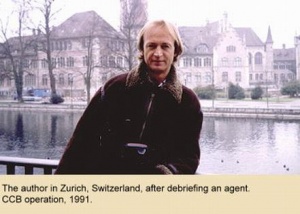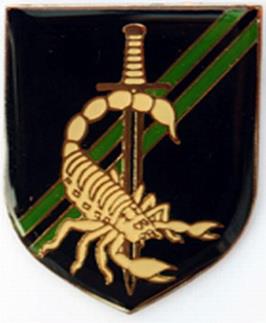Difference between revisions of "Executive Outcomes"
(EO Badge and Picture of Eeben Barlow) |
|||
| Line 48: | Line 48: | ||
==Sandline International== | ==Sandline International== | ||
| − | Executive Outcomes was often linked loosely with the United Kingdom private military company, Sandline International, but in 1997 Sandline directly subcontracted Executive Outcomes for their operation in Papua New Guinea to oust the rebels holding the Pangua mine on Bougainville Island which led to the so-called "[[Sandline affair]]" when news of the government's intention to hire mercenaries was leaked to the Australian press. | + | Executive Outcomes was often linked loosely with the United Kingdom private military company, [[Sandline International]], but in 1997 Sandline directly subcontracted Executive Outcomes for their operation in Papua New Guinea to oust the rebels holding the Pangua mine on Bougainville Island which led to the so-called "[[Sandline affair]]" when news of the government's intention to hire mercenaries was leaked to the Australian press. |
The Commander of the Papua New Guinea Defence Force, Jerry Singirok - who had not been consulted - ordered the detaining of all the mercenaries on their arrival, and forced the Prime Minister Sir Julius Chan to resign with Papua New Guinea coming close to a military coup. | The Commander of the Papua New Guinea Defence Force, Jerry Singirok - who had not been consulted - ordered the detaining of all the mercenaries on their arrival, and forced the Prime Minister Sir Julius Chan to resign with Papua New Guinea coming close to a military coup. | ||
Revision as of 20:46, 27 November 2013
Executive Outcomes was a private military company founded in South Africa by a former Lieutenant-Colonel of the South African Defence Force Eeben Barlow in 1989. It later became part of the South African-based holding company Strategic Resource Corporation.[1]
Executive Outcomes (EO) claimed to provide military personnel, training and logistical support to officially recognized governments only. However, their are many credible allegations of them providing the military strength for corporations to control natural resources in weak/failed states or conflict-ridden areas. EO always claimed to have had the host government’s approval to provide such assistance.
Contents
Mission statement
Executive Outcomes' mission statement was described by the company as[2]:
- To provide a highly professional and confidential military advisory service to legitimate governments.
- To provide sound military and strategic advice.
- To provide the most professional military training packages currently available to armed forces, covering aspects related to sea, air, and land warfare.
- To provide advice to armed forces on weapon and weapon platform selection.
- To provide a total apolitical service based on confidentiality, professionalism, and dedication.
Background
In 1989, following the conclusion of the Border Wars in Angola and Namibia, the apartheid regime in South Africa was beginning to dissolve. The South African Defence Force was looking at broad cuts in its personnel. African National Congress leader Nelson Mandela demanded that then South African President F W de Klerk dismantle some of the South African and South-West African Special Forces units such as 32 Battalion, Koevoet and the Reconnaissance Regiments. One of these was the Civil Cooperation Bureau (CCB), a unit that carried out covert operations which included assassinations of government opponents, and worked to bypass the United Nations apartheid sanctions by setting up overseas front companies.
Only Koevoet — being part of the South West African Police (SWAPOL) — was disbanded as part of independence negotiations for South-West Africa (now Namibia). Many members of the other units, or simply former national servicemen, were recruited by Executive Outcomes (EO).
Formation

Eeben Barlow, formerly in charge of the Western European section of the CCB, [3] established Executive Outcomes (EO) in 1989. Its aim was to provide specialised covert training to Special Forces members. Barlow was also awarded a contract by Debswana to train a selected group of security officers to infiltrate and penetrate the illegal diamond dealing syndicates in Botswana. When Debswana discovered EO was training the Angolan Armed Forces (FAA), it promptly cancelled EO’s contact.
Many of Barlow’s Special Forces students would later join him at EO after he started recruiting men to assist with the training of the Angolan forces Say's Walter Halicki one of Eeben's associates in the FAA.
The company also went on to recruit many of its personnel from the units President F. W. De Klerk disbanded. Within a short period, EO could boast of having 500 military advisers and over 3000 highly-trained military personnel at its disposal. Although EO was approached by many foreign soldiers for work, it only recruited men from South Africa who had either served in the SADF, Koevoet or the ANC’s armed wing Umkhonto we Sizwe (MK).
Barlow registered Executive Outcomes Ltd in the UK on the insistence of the South African Reserve Bank.
Activities
Executive Outcomes initially trained and later fought on behalf of the Angolan government against UNITA after UNITA refused to accept the election results in 1992. This contract was awarded to the company after EO had assisted Ranger Oil with an equipment recovery operation in the harbour town of Soyo. Dubbed by the South African media as an attempt to assassinate the rebel leader Dr. Jonas Savimbi, EO found itself under constant UNITA attacks where it lost three of its men. This action saw EO as being recognised by the FAA and a contract to train its forces was duly awarded. UNITA was defeated on the battlefield and sued for peace. The Angolan government, under pressure from the UN and the USA, were forced to terminate EO’s contract. EO was replaced by the UN’s peacekeeping force known as UNAVEM. Angola returned to war shortly thereafter.
Executive Outcomes was directly involved militarily in Angola and Sierra Leone. It had contracts with multinational corporations such as De Beers, Chevron, JFPI Corporation, Rio Tinto Zinc and Texaco. The governments of Angola, Sierra Leone, and Indonesia were also clients.
Key personnel
Other senior Executive Outcomes personnel were Lafras Luitingh and Nic van der Bergh.
Dissolution
EO actively encouraged the SA government to enforce a regulation of PMCs as several South African and international companies were masquerading for work under the banner of Executive Outcomes. Additionally, EO was actively engaged in providing input into the formulation of the bill which became known as “Regulation of Foreign Military Assistance Act” in 1998. EO was duly provided with a license stipulating that it met the requirements of the newly introduced Act but it was nevertheless dissolved on 31 December 1998.
The aim of the Act was to stop mercenary activities by the dual actions of:
- preventing direct participation as a combatant in armed conflict for private gain including the training, recruitment and use of mercenaries; and,
- requiring approval of the National Conventional Arms Control Committee for offering of military assistance overseas. [4]
Many of the company’s members went on to seek employment with other PMCs such as Lifeguard, Sandline and Saracen.
Sandline International
Executive Outcomes was often linked loosely with the United Kingdom private military company, Sandline International, but in 1997 Sandline directly subcontracted Executive Outcomes for their operation in Papua New Guinea to oust the rebels holding the Pangua mine on Bougainville Island which led to the so-called "Sandline affair" when news of the government's intention to hire mercenaries was leaked to the Australian press.
The Commander of the Papua New Guinea Defence Force, Jerry Singirok - who had not been consulted - ordered the detaining of all the mercenaries on their arrival, and forced the Prime Minister Sir Julius Chan to resign with Papua New Guinea coming close to a military coup.
See also
References
- ↑ The Privatisation of Violence: New mercenaries and the state Christopher Wrigley CAAT March 1999
- ↑ The New Mercenaries and the Privatization of Conflict Thomas K. Adams Parameters, Summer 1999
- ↑ Eeben Barlow's autobiography: Executive Outcomes - Against all Odds
- ↑ Chapter 2 — The Private Military Companies' Perspective Select Committee on Foreign Affairs August 1, 2002
- The book "Untapped: The Scramble for Africa's Oil" by John Ghazvinian discusses Executive Outcomes participation in coup attempts.
External links
- Mirror of Executive Outcomes' official website in 1998, from archive.org
- Licensed to Kill, Hired Guns in the War on Terror by Robert Young Pelton (Crown, Sept 1, 2006)
- The Hunter, The Hammer, and Heaven: Journeys to Three Worlds Gone Mad, by Robert Young Pelton (ISBN 1-58574-416-6)
- Executive Outcomes page by GlobalSecurity.org
- Profile: Simon Mann BBC News September 10, 2004
- War Dog: Fighting Other People's Wars by Al J Venter (Casemate, Feb 2006)
